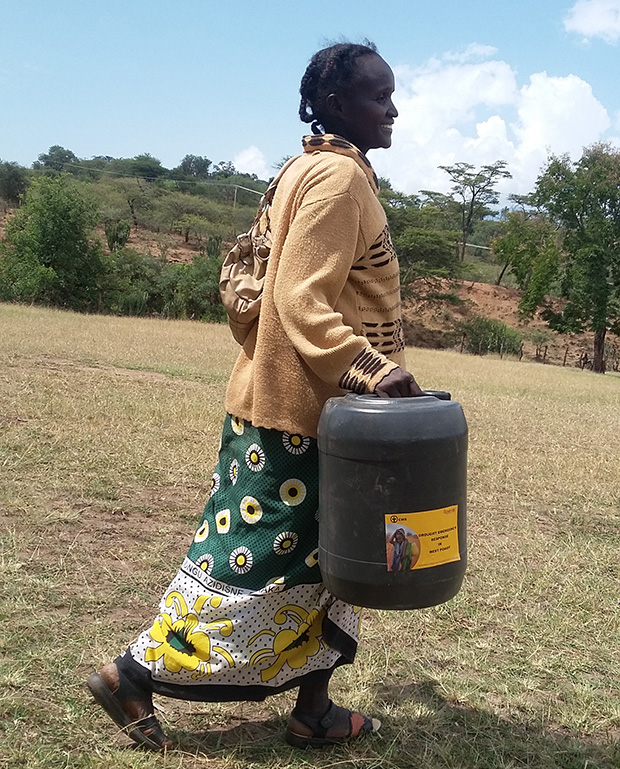
A woman carries a jerry can that was distributed as part of CWS drought response efforts in West Pokot, Kenya in 2017. Women have reported that improved access to water has reduced tension within families.
On what occasions do you beat drums? Better still, have you ever witnessed the beating of drums? Across Africa, drum beating has been considered the heartbeat of Africa – a sacred call to respond fully in body, mind and spirit to a situation. So, as we mark International Women’s Day, we know that it’s about time to beat the drum to end gender based violence in Kenya’s West Pokot County.
While the country has made great strides over the past decade to strengthen its legal framework to prevent Gender-Based Violence against women and girls, GBV remains a reality for many women and girls among pastoralist communities in Kenya’s arid north and northwest. This is particularly true within communities where patriarchal social structures are deeply rooted.
CWS has worked in Kenya’s West Pokot County since 2008 to improve access to water, education and livelihoods in pastoralist communities, for whom raising livestock is the main – if not only – form of survival. Throughout our programs and partnerships, our team has emphasized women’s leadership in development activities like water user committees, parent-teacher associations and microfinance groups. Our experience has shown that where women actively lead in development, projects are more likely to yield positive results for all members of the community.
One positive ripple effect from this approach has been a gradual change in attitudes toward gender-based violence, including spouse-beating, forced marriage and other forms of physical or emotional abuse. Women have reported that improved access to water has reduced tension within families, and group savings have enhanced women’s earning potential and reduced their dependence on male relatives. Coupled with greater roles in community development, this has earned women more respect from men, and expands their opportunities to provide leadership in other arenas – including the prevention of GBV.
CWS is now working with local partner Yang’at to design and pilot GBV prevention activities, incorporating community-driven approaches such as peer education led by women and girls, use of song and dance in sharing anti-violence messages and engaging faith and customary leaders on shifting local attitudes and practices. Yang’at, which means “Care” in the Pokot language, is a women-led organization founded in 1999 to expand access to education by both girls and boys.
We are also working with various stakeholders, including members of academia in Kenya, to conduct a comprehensive study on GBV that will inform future activities and allow CWS and its community partners to assess the impact of innovative approaches to preventing violence against women and girls. Data collection began in early 2018, building on informal focus groups that CWS organized in late 2017.
This International Women’s Day, join CWS in solidarity with women and girls in West Pokot. #ItsAboutTime to #BeatTheDrum to end Gender Based Violence!
Donate to support women in Kenya at cwsglobal.org/its-about-time.
Andrew Fuys is the Senior Director in CWS’s Immigration and Refugee Program.
